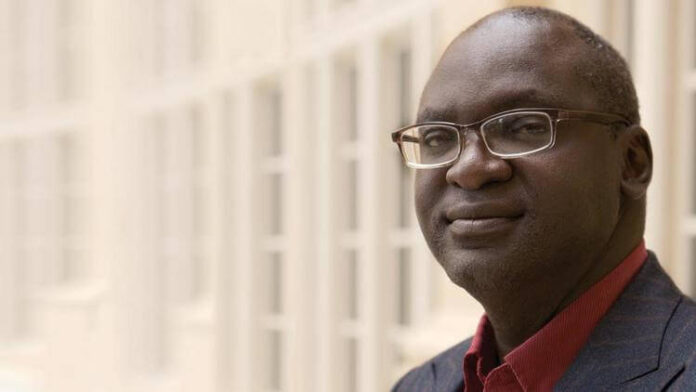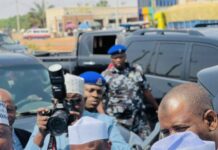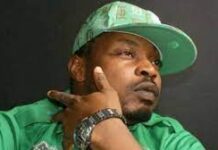2023 Election Court Diary: Anticlimactic end to trial as Respondents close case with Tinubu’s sole witness’ faulty credentials
By Emmanuel Ogebe
Continuing a pattern set by the first respondent INEC yesterday, second and third respondents Tinubu and Shettima also closed their defense today after calling just one witness. In an anti-climactic twist, the fourth respondent APC also closed their defense without calling any witnesses.
The witness, a serving senator, Opeyemi Bamidele and just-elected majority leader, stated that he was a member of the New York and Nigerian bars and adopted his witness statement and exhibits contradicting the case of the LP Petitioners.
However he hit stormy waters when in “cross examination” by his own side, he encountered friendly fire.
Counsel for APC had finished what was otherwise a seamless examination and his time had run out when he scored an own goal against his side with “one last question.”
He asked the witness if he had proof of membership of the New York Bar as claimed. The witness answered affirmatively and attempted to tender his identification.
However, the sharp-eyed presiding Justice, Haruna Tsamani, PJ, detected that it was an “American Bar Association” card and not a New York bar license.
When asked, the witness claimed that all lawyers when admitted to a state bar become members of the ABA.
Unfortunately this was inaccurate as the US has no mandatory national bar. Each state licenses through its local mandatory bar.
I immediately googled the ABA which I am familiar with and whom several of my US colleagues have worked for.
Wikipedia states: “The American Bar Association (ABA) is a voluntary bar association of lawyers and law students; it is not specific to any jurisdiction in the United States. Founded in 1878,[2] the ABA’s stated activities are the setting of academic standards for law schools, and the formulation of model ethical codes related to the legal profession. As of fiscal year 2017, the ABA had 194,000 dues-paying members, constituting approximately 14.4% of American attorneys.[3] In 1979, half of all lawyers in the U.S. were members of the ABA.[4] The organization’s national headquarters are in Chicago, Illinois, and it also maintains a significant branch.”
American Bar Association being a voluntary bar, it is false that we are all members of it. Therefore it doesn’t prove NY bar membership of the witness.
There is an NBA in the US – the National Bar Association. However it is also voluntary and its membership is largely Black American lawyers. Belonging to either ABA or NBA in USA is no proof of membership of a bar. In fact several of the SANs in court who were my classmates in Nigeria, attend these associations’ conferences in the US as affiliates without licensing by any US state bar!
This was a terrible misadventure as the court was already minded to accept his status on his own recognizance and had even asked APC’s counsel whether his qualification was in issue when he first raised the question.
As posited in my preceding report, rather than the co-respondents having multiple questioning of their side’s witness, a more meaningful use of time would have been to have PDP lawyers do so as well now in the morning session.
As it stood, Uche SAN was the sole party on his side of the case with INEC, Tinubu and APC on the other side in an outnumbered but not outmatched 1-3 standoff the day when he won the argument of order of questioning.
Now in a similar configuration of LP outnumbered 1-3 sets of counsel, one of the three complicated the testimony of their own witness.
Expectedly during cross examination by LP, they pointedly asked the defense witness whether it was true that ABA was a voluntary organization. He stutteringly answered in the affirmative.
“So you have not presented before the court evidence of your licensing in New York?”
Again he affirmed this was true.
“Are you licensed in Illinois?”
Again, “no” but he claimed licensing generally in all federal courts which is also debatable.
Another bizarre incident was when Olanipekun SAN objected to LP exhibiting the EU observer final report claiming it had already been tendered.
The court however reminded him that it was tendered in the other case – he was confusing the two.
This illustrates how operating multiple cases on the same facts, evidence and issues can be problematic.
READ ALSO: 2023 Election Court Diary (6): Why the hearings should be broadcast
The same Exhibits in both cases will have different names and cause confusion to counsel and the court who are in both matters.
Rather than have duplicity of counsel for both the individual and the party, division of labor could have been done to better utilize all the counsel in court. An English idiom holds that “too many cooks spoil the broth.” This appears to be a recurring decimal in the various election cases I have seen over the years.
During the arguments earlier in the week, several SANs alluded to occurrences in 2019 election trials.
The tragic truth is there is no record of what transpired in those trials. There is no audio recording and no video recording. There’s no court transcript. The only thing that exists is the handwritten notes of the justices which are later typed up as record of proceedings when the parties pay for it pursuant to an appeal. Parties are therefore at the mercy of what the judge wrote or failed to write in his file.
In a death row appeal of a case I have been involved with pro bono, over N600,000 was demanded just to get a typed copy of the record of proceedings for a poor farmer imprisoned awaiting trial for six years.
When we’re battling as a society to capture our history, we are simultaneously failing to capture even our present!
Archaeologists are unearthing hieroglyphics in Egypt, scrolls in Israel in an effort to decipher communications that reveal life from centuries past but in Nigeria, there is no permanent dispassionate record of what truly happens in our courts. This cannot be right!
The era of oral tradition which disadvantaged us competitively is over. History belongs to data and those that document. This is why Mungo Park discovered the Niger and not those who daily drank from it but didn’t copyright it. As Chinua Achebe sagely cautioned us, “Until the lion learns to tell it’s tale, the stories will only be about the glorious hunter” (Things Fall Apart).
Having tendered it, LP’s counsel read out the report of the EU observers that more than 1/4 of results were not uploaded at the time of a Declaration of president-elect without justification.
He then asked the witness to read from a previously admitted exhibit of ECOWAS observer mission he had tendered where six people were killed in Enugu and five in Kano to which the witness added “I don’t agree with” this – from his own exhibit!
He tried to waffle when asked if the case was about “Money laundering” and that the US court had said it was “narcotic trafficking,” drawing the ire of all, the court inclusive.
Finally, he admitted that he had not reviewed the IREV.
He did make a point that the US letter to the police claimed Tinubu had no criminal record in the US. However I was puzzled as to why the letter from US Embassy’s Legal Attaché FBI Agent Jennifer Dent informing the EFCC that there was no record of Tinubu at University of Chicago was not presented to the witness.
Thus in under three hours, three parties closed their case.
While the preponderance of witnesses is helpful, it does not exclusively make a case.
Tinubu’s counsel Olanipekun is not a litigator to trifle with.
In the 2007 election trial, he attempted to dismiss the election petition before the trial. However the court dismissed his motion instead.
Interestingly after the full hearing of the case, many of the issues raised at the preliminary stage by himself and Kanu Agabi SAN were reflected in the courts final judgment.
Olanipekun may well have another ace in the hole. In 2007, the unbelievably sophomoric evidentiary errors of petitioner’s counsel who deposed to affidavits before themselves in their own chambers thus nullifying their entire witness statements was a classic example.
The objections reserved for final address should be a source of concern and research for all the parties now.
Interestingly, Olanipekun asked the court to allow the objection arguments to be 10 pages long and different from the 40-page allotment for final addresses.
He also tendered evidence about Peter Obi’s non-membership of the LP per the submitted register. LP did not cross examine the witness on this point to my recollection.
I was relieved at the conclusion of the case before my departure for the funeral of a dear family member.
However I am pained that I will miss the closing address which will not be televised or recorded unless the court orders otherwise as I will be back in the US then.
All we have seen is shopping in the market for cooking ingredients. The final addresses are the finished soup and the judgment is the verdict of the taste of the eating.
I must caution that no one in Nigeria knows what is in the ingredients. Hundreds of thousands of pages of exhibits were tendered -mostly unread by the parties and the court. What they contain may radically alter the little aroma of the ingredients that were smelt in court.
If the courts won’t broadcast the rest of the trial, they should at least upload them online so the public has access to them to be able to follow the legal issues and reasoning.
Finally I felt tremendous relief on behalf of the justices:
Justice Haruna Tsammani
Justice Stephen Adah
Justice Monsurat Bolaji-Yusuf
Justice Moses Ugo
Justice Abba Mohammed.
They are highly intellectually astute and they’re fully committed. They seldom took breaks and they were always ready to proceed. I believe the fate of the nation is in the hands of eminently capable justices.
I must lament the fact that sitting all day from 9-6pm with only an hour’s break is detrimental to their health. Sedentary lifestyle is deadly and although the lawyers got to stand up from time to time, the judges sat throughout the proceedings.
My dad who was on the bench for over 30 years had chronic back pain since he was in the high court. Upon returning from court, he would lie prone for the rest of the day.
Being a judge is one of the most thankless jobs in Nigeria. You endure risk and insults trying to resolve other people’s problems. Lawyers earn in one case what a judge will never earn in his life but when they make mistakes and lose, they blame the judge rather than take ownership of their faults.
Recently we read that the retirement benefits of a Lieutenant General for the Nigerian Army, Vice Admiral for the Navy and Air Marshal for the Air Force include two Peugeot 508 cars, or one Toyota Land Cruiser, two cooks, two stewards, four residential guards, one service orderly, two service drivers, free medical treatment in the country and abroad to the tune of $20,000 yearly.
A Justice of the Court of Appeal is the equivalent of a Lt General at minimum but at most retires with one vehicle and one orderly despite the numerous enemies they make on the bench over decades in cases they decide.
My dad who retired from the Supreme Court in 2010 (equivalent to a General) retired with the official car he had. After changing engine once, it finally knocked again and is unusable after 13 years. He cannot afford to purchase a new car on his pension. The last new car he purchased was a Volvo in 1978 when he was a high court judge which he later donated to Scripture Union in Benin when he was serving as a Justice of the Court of Appeal.
Unlike the military officers, justices do not have homes built for them in retirement. The number of Generals who retired this week exceed the entire number of Justices of the Court of Appeal currently in service today. The pensions of Justices do not maintain them at the standard of living they were accustomed to on the bench.
For the next three weeks, as the lawyers move on to other cases and foreign vacations and ABA conferences etc., their Lordships will be imprisoned by the weight of the nation’s problems, sifting through stacks of documents, trying to determine between skilled lawyers and distinguished witnesses, wherein lies the truth.
This is the burden of Justice on Justices.
My sense is that the court would benefit from amicus briefs to help streamline the issues in this case.
I was gratified to learn that the Nigerian Bar Association will be aiding in prosecuting election offenders – a proposal which I had made to the bar leadership.
I do not think it is out of place for NBA to file an amicus brief at the election court to help salvage our nation from a collapse of the rule of law and our democratic aspirations.
I did not return to the court for PDP’s hearing. I do not expect anything more.
- Emmanuel Ogebe, Esq, is a prominent US-based international human rights lawyer and Nigeria pro-democracy advocate with the US NIGERIA LAW GROUP in Washington. Last month, he marked the 27th anniversary of his abduction and torture by Gen. Abacha for demanding an investigation of the assassination of pro-democracy icon Kudirat Abiola over the June 12 election annulment. His advocacy led to the naming of Kudirat corner by Nigeria house in New York, the US designation of Boko Haram as a foreign terrorist organization and International Criminal Court Prosecutor’s determination of crimes against humanity in Nigeria amongst others.














